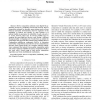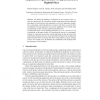151
click to vote
PERCOM
2010
ACM
15 years 15 days ago
2010
ACM
Abstract—Service composition schemes create high-level application services by combining several basic services. Service composition schemes for dynamic, open systems, such as th...
108
click to vote
ER
2010
Springer
15 years 19 days ago
2010
Springer
Abstract. We address the challenge of adaptation in open systems. Open systems are characterized by interactions among autonomous and heterogeneous participants. In such systems, e...
121
click to vote
AAMAS
2002
Springer
15 years 1 months ago
2002
Springer
Abstract. Open systems are becoming increasingly important in a variety of distributed, networked computer applications. Their characteristics, such as agent diversity, heterogenei...
113
click to vote
AAMAS
2006
Springer
15 years 2 months ago
2006
Springer
In many dynamic open systems, agents have to interact with one another to achieve their goals. Here, agents may be self-interested and when trusted to perform an action for another...
145
click to vote
AIL
2008
15 years 2 months ago
2008
Software agents' ability to interact within different open systems, designed by different groups, presupposes an agreement on an unambiguous definition of a set of concepts, ...
130
Voted
ESAW
2008
Springer
15 years 3 months ago
2008
Springer
Abstract. Electronic markets, dispute resolution and negotiation protocols are three types of application domain that can be viewed as open agent systems. Members of such systems a...
128
click to vote
ECOOP
1995
Springer
15 years 5 months ago
1995
Springer
PSL is a framework for describing dynamic and architectural properties of open systems. PSL extends established interface-based tactics for describing the functional properties of...
113
click to vote
ECAI
2006
Springer
15 years 5 months ago
2006
Springer
Existing approaches to knowledge representation and reasoning in the context of open systems either deal with "objective" knowledge or with beliefs. In contrast, there ha...
112
click to vote
CAV
2006
Springer
15 years 5 months ago
2006
Springer
Abstract. We present a brief overview of the tool Ticc (Tool for Interface Compatibility and Composition). In Ticc, a component interface describes both the behavior of a component...
121
click to vote
AOSE
2006
Springer
15 years 5 months ago
2006
Springer
Abstract. Governance means that specifications are enforced dynamically at application runtime. Governance framework is a technique to design and implement an extensible interactio...


